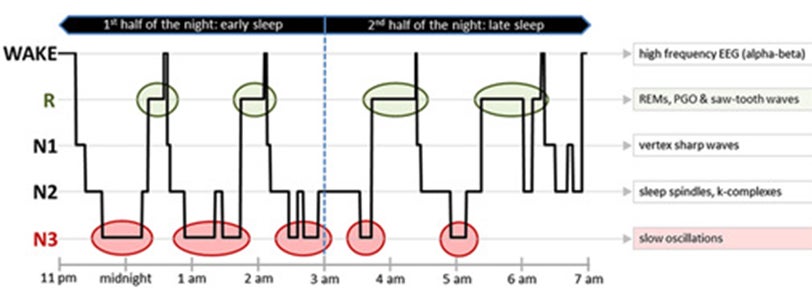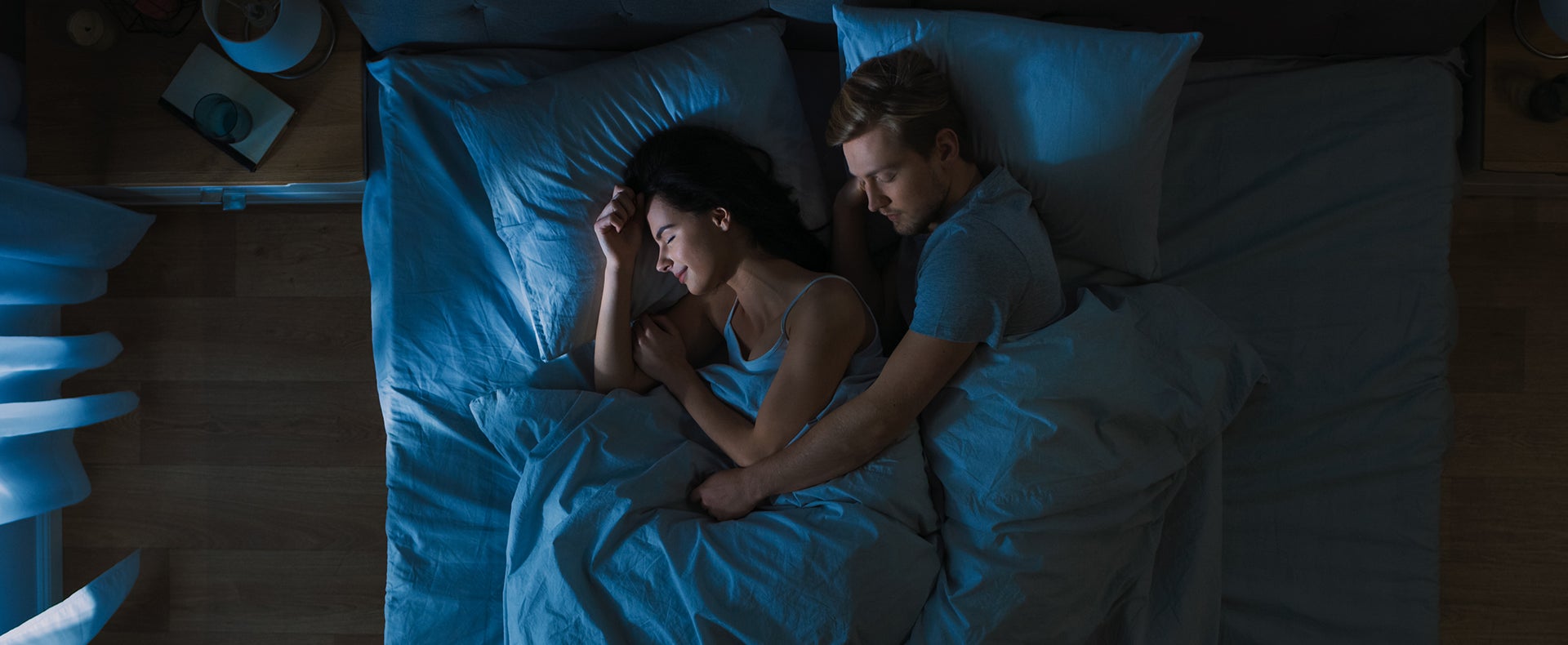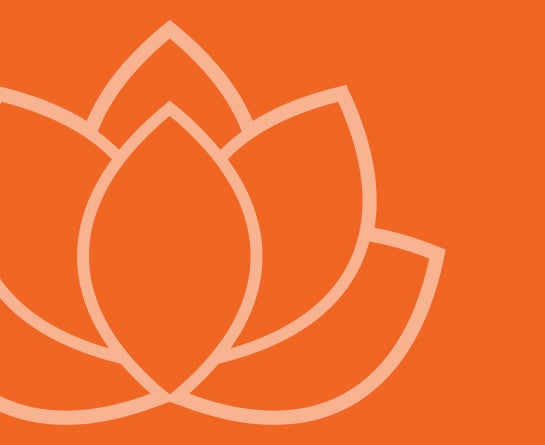Referenzen
1CDC. Data and Statistics – Sleep and Sleep Disorders. National Center for Chronic Disease Prevention and Health Promotion, Division of Population Health https://www.cdc.gov/sleep/data_statistics.html (2017) Last accessed: 01/27/2020
2Blume, C., del Giudice, R., Wislowska, M., Lechinger, J. & Schabus, M. Across the consciousness continuum—from unresponsive wakefulness to sleep. Front. Hum. Neurosci. 9, (2015).
3Groch, S., Wilhelm, I., Diekelmann, S. & Born, J. The role of REM sleep in the processing of emotional memories: Evidence from behavior and event-related potentials. Neurobiol. Learn. Mem. 99, 1–9 (2013).
4Ohayon, M. et al. National Sleep Foundation’s sleep quality recommendations: first report. Sleep Heal. 3, 6–19 (2017).
5Van Cauter, E. et al. Reciprocal interactions between the GH axis and sleep. Growth Horm. IGF Res. 14, (2004).
6Brandenberger, G., Ehrhart, J., Piquard, F. & Simon, C. Inverse coupling between ultradian oscillations in delta wave activity and heart rate variability during sleep. Clin. Neurophysiol. 112, 992–6 (2001).
7Tasali, E., Leproult, R., Ehrmann, D. A. & Van Cauter, E. Slow-wave sleep and the risk of type 2 diabetes in humans. Proc. Natl. Acad. Sci. U. S. A. 105, 1044–1049 (2008).
8Hablitz, L. M. et al. Increased glymphatic influx is correlated with high EEG delta power and low heart rate in mice under anesthesia. Sci. Adv. 5, eaav5447 (2019).
9Mullington, J. M., Simpson, N. S., Meier-Ewert, H. K. & Haack, M. Sleep loss and inflammation. Best Practice and Research: Clinical Endocrinology and Metabolism vol. 24 775–784 (2010).
10Irwin, M. R. Sleep and Infectious Disease Risk. Sleep 35, 1025–1026 (2012).
11Smith, T. J. et al. Impact of sleep restriction on local immune response and skin barrier restoration with and without multinutrient nutrition intervention. J. Appl. Physiol. 124, 190–200 (2018).
12Schmid, S. M., Hallschmid, M., Jauch-Chara, K., Born, J. & Schultes, B. A single night of sleep deprivation increases ghrelin levels and feelings of hunger in normal-weight healthy men. J. Sleep Res. 17, 331–334 (2008).
13Taheri, S., Lin, L., Austin, D., Young, T. & Mignot, E. Short sleep duration is associated with reduced leptin, elevated ghrelin, and increased body mass index. PLoS Med. 1, 210–217 (2004).
14Leproult, R. & Van Cauter, E. Role of sleep and sleep loss in hormonal release and metabolism. Endocrine Development vol. 17 11–21 (2009).
15Donga, E. et al. A single night of partial sleep deprivation induces insulin resistance in multiple metabolic pathways in healthy subjects. J. Clin. Endocrinol. Metab. 95, 2963–2968 (2010).
16Gangwisch, J. E., Malaspina, D., Boden-Albala, B. & Heymsfield, S. B. Inadequate sleep as a risk factor for obesity: Analyses of the NHANES I. Sleep 28, 1289–1296 (2005).
17Beccuti, G. & Pannain, S. Sleep and obesity. Current Opinion in Clinical Nutrition and Metabolic Care vol. 14 402–412 (2011).
18Yuan, R., Wang, J. & Guo, L. li. The Effect of Sleep Deprivation on Coronary Heart Disease. Chinese Medical Sciences Journal vol. 31 247–253 (2016).
19Kim, T. W., Jeong, J. H. & Hong, S. C. The impact of sleep and circadian disturbance on hormones and metabolism. International Journal of Endocrinology vol. 2015 (2015).
20Leproult, R. & Van Cauter, E. Effect of 1 week of sleep restriction on testosterone levels in young healthy men. JAMA – Journal of the American Medical Association vol. 305 2173–2174 (2011).
21Baker, F. C. & Lee, K. A. Menstrual Cycle Effects on Sleep. Sleep Medicine Clinics vol. 13 283–294 (2018).
22Fernandez, R. C. et al. Sleep disturbances in women with polycystic ovary syndrome: prevalence, pathophysiology, impact and management strategies. Nat. Sci. Sleep 10, 45–64 (2018).
23Teo, J. X. et al. Digital phenotyping by consumer wearables identifies sleep-associated markers of cardiovascular disease risk and biological aging. Commun. Biol. 2, (2019).
24McMurray, R. G. & Brown, C. F. The effect of sleep loss on high intensity exercise and recovery. Aviat. Sp. Environ. Med. 55, 1031–1035 (1984).
25Buchmann, N. et al. Schlaf, Muskelmasse und Muskelfunktion im Alter. Dtsch. Arztebl. Int. 113, 253–260 (2016).
26Vitale, K. C., Owens, R., Hopkins, S. R. & Malhotra, A. Sleep Hygiene for Optimizing Recovery in Athletes: Review and Recommendations. Int. J. Sports Med. 40, 535–543 (2019).
27Anderson, K. N. & Bradley, A. J. Sleep disturbance in mental health problems and neurodegenerative disease. Nature and Science of Sleep vol. 5 61–75 (2013).
28Waters, F., Chiu, V., Atkinson, A. & Blom, J. D. Severe sleep deprivation causes hallucinations and a gradual progression toward psychosis with increasing time awake. Frontiers in Psychiatry vol. 9 (2018).
29Yoo, S. S., Gujar, N., Hu, P., Jolesz, F. A. & Walker, M. P. The human emotional brain without sleep – a prefrontal amygdala disconnect. Current Biology vol. 17 (2007).
30Alhola, P. & Polo-Kantola, P. Sleep deprivation: Impact on cognitive performance. Neuropsychiatric Disease and Treatment vol. 3 553–567 (2007).
31Uehli, K. et al. Sleep problems and work injuries: A systematic review and meta-analysis. Sleep Medicine Reviews vol. 18 61–73 (2014).
32American Safety Council. 10 Sleep Deprivation Hazards on the Worksite | OSHA 10. https://www.americansafetycouncil.com/content/osha-10-safety/. Last accessed: 01/27/2020
33Tefft, B. C. Acute sleep deprivation and culpable motor vehicle crash involvement. Sleep 41, (2018).
34NHTSA. Drowsy Driving. NHTSA https://www.nhtsa.gov/risky-driving/drowsy-driving (2017). Last accessed: 01/27/2020
35O’callaghan, F., Muurlink, O. & Reid, N. Effects of caffeine on sleep quality and daytime functioning. Risk Management and Healthcare Policy vol. 11 263–271 (2018).
36Sforza, E. & Roche, F. Chronic intermittent hypoxia and obstructive sleep apnea: an experimental and clinical approach. Hypoxia 99 (2016) doi:10.2147/hp.s103091.
37American Sleep Apnea Association. Sleep Apnea Information for Clinicians – Sleep Apnea. https://www.sleepapnea.org/learn/sleep-apnea-information-clinicians/. Last accessed: 01/27/2020
38Mistlberger, R. E. & Skene, D. J. Social influences on mammalian circadian rhythms: animal and human studies. Biol. Rev. 79, 533–556 (2004).
39Kozaki, T., Kubokawa, A., Taketomi, R. & Hatae, K. Effects of day-time exposure to different light intensities on light-induced melatonin suppression at night. J. Physiol. Anthropol. 34, 27 (2015).
40Sűdy, Á. R., Ella, K., Bódizs, R. & Káldi, K. Association of Social Jetlag With Sleep Quality and Autonomic Cardiac Control During Sleep in Young Healthy Men. Front. Neurosci. 13, (2019).
41López, V., Nielsen, B., Solas, M., Ramírez, M. J. & Jäger, A. K. Exploring pharmacological mechanisms of lavender (Lavandula angustifolia) essential oil on central nervous system targets. Front. Pharmacol. 8, (2017).
42Elsas, S. M. et al. Passiflora incarnata L. (Passionflower) extracts elicit GABA currents in hippocampal neurons in vitro, and show anxiogenic and anticonvulsant effects in vivo, varying with extraction method. Phytomedicine 17, 940–949 (2010).
43Babson, K. A., Sottile, J. & Morabito, D. Cannabis, Cannabinoids, and Sleep: a Review of the Literature. Current Psychiatry Reports vol. 19 (2017).
44Boonstra, E. et al. Neurotransmitters as food supplements: The effects of GABA on brain and behavior. Frontiers in Psychology vol. 6 (2015).
45Krueger, J. The Role of Cytokines in Sleep Regulation. Curr. Pharm. Des. 14, 3408–3416 (2008).
46Kimura, M., Kapás, L. & Krueger, J. M. Oxidized glutathione promotes sleep in rabbits. Brain Res. Bull. 45, 545–8 (1998).
47Zalewski, P. et al. Cardiovascular and Thermal Response to Dry-Sauna Exposure in Healthy Subjects. Physiol. J. 2014, 1–10 (2014).
48Inoué, S. & Kabaya, M. Biological activities caused by far-infrared radiation. International Journal of Biometeorology vol. 33 145–150 (1989).
49Honda, K. & Inoué, S. Sleep-enhancing effects of far-infrared radiation in rats. Int. J. Biometeorol. 32, 92–4 (1988).




